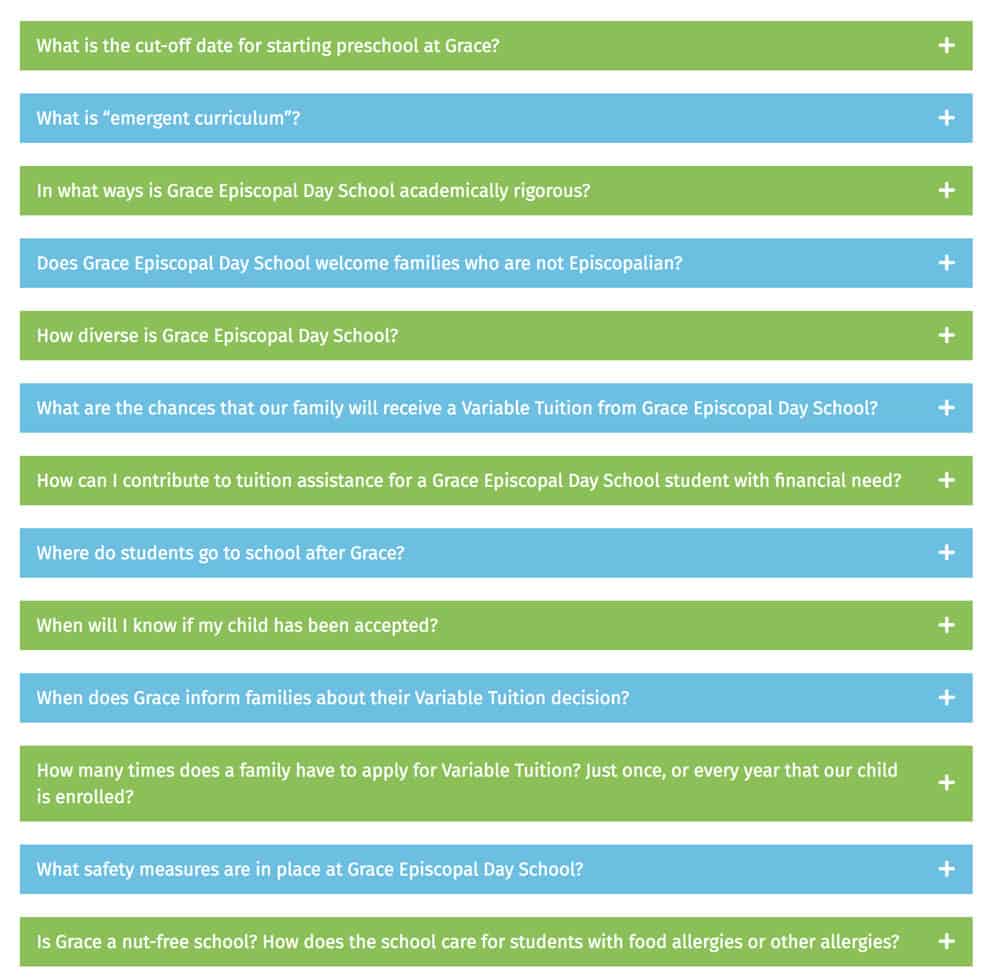3 Reasons Why School and Camp Websites Should Have a FAQ Page

When we look at other school and camp websites for inspiration, we notice that a lot of them do not have a FAQ (Frequently Asked Questions) page. This is a missed opportunity! Here are 3 reasons why your website should have a FAQ page and how to make your FAQ web design and content effective.
Why have a Frequently Asked Questions Page on Your Website?
- A FAQ page helps create a better user experience on your school or camp website.
This page can be a resource to educate, inform and guide the user in a natural way through your website’s content and toward the goals and end results you have set. - A FAQ page is can improve your organization’s SEO
- Your page should contain links to related content on other pages of your website to provide your user with more information.This will boost your internal link-building, which is an important search ranking factor.
- Using a natural, conversational style can help to capture voice search queries, which are becoming more important in search result rankings.
- FAQ pages are good candidates to be selected by Google as Featured Snippets, or “position zero.” (Featured snippets are different from Rich Snippets, which we described in this blog post.)
- A FAQ page can help establishes trust and begin a relationship with your prospective parents
Having a FAQ page on your site shows parents you are invested in helping them find solutions. This helps create a sense of trust for your school or camp. Providing answers to common questions also demonstrates thought leadership and authority, which makes parents more confident about trusting you with their children’s education and care.
Now that we know why you should have a FAQ page, let’s review HOW to have an effective FAQ web design and content.
- Keep a list of questions you actually ARE asked repeatedly. Those are obvious questions to include.
- Do keyword research to find trending searches in your industry and use your FAQ page to provide answers.
- Keep it updated with correct information. We go over how to check your website content at least once a year to make sure you haven’t missed anything in this blog post.
- Make answers clear and authoritative, and no more than a single paragraph (40-90 words).
- Include internal and external links where relevant/appropriate.
- Design for easy “at-a-glance” reading. If you have a lot of questions, organize them into categories and make these easy to filter. This website for Beginnings School is overwhelming and could use some organization and simplification. By contrast, WhatsApp’ FAQ page has a nice, clean design with categories and a list of questions. Each question is answered simply on a new page with clear navigation back to the main FAQs page.
- Consider an “accordion” FAQ web design that shows the list of questions, and opens with a click to reveal the answer. This makes the page less overwhelming with a lot of text, and makes the questions easier to scan. Grace Episcopal Day School uses alternating colors to separate each question in an accordion format. Accordions are not always the answer, and if you use them, be sure they work, unlike this example, where the Whitby School’s answer becomes unreadable as it jumps off the page when the accordion is opened.

If your website does not have a FAQ page, it’s time to create one! If your website is built with WordPress, there are plugins, such as Accordion FAQ, which make it easy to do it yourself and look professional.
Poll your staff to create a list of questions they get asked often, and take the time to write clear and concise answers. This is also a good opportunity to also review your current website to make sure that information is easy to find. For example, if you are often asked “What is the tuition?” this may indicate that you need to label your tution page more clearly and make sure it is in your website navigation.
Need help? We’d love to chat with you and take a look at your current site to give you some suggestions.
FAQ or FAQs?
“A FAQ is a collection of Frequently Asked Question(s) for a specific topic.
FAQs are a collection of multiple lists of FAQ.”